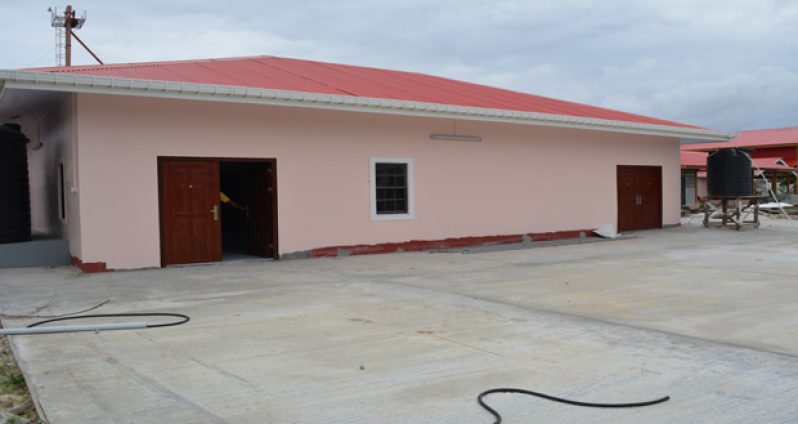WITH the steep drop in gold and rice prices countrywide, farmers and miners have thrown their hands in the air in despair, but Essequibo Coast businessman Roopan Ramotar has found a way to navigate himself out of these difficult circumstances.This seasoned entrepreneur is building a state-of-the-art coconut processing plant at Land of Plenty on the Essequibo Coast, and is hoping that the investment will yield abundant returns.

Ramotar told the Guyana Chronicle that the downturn in rice and gold prices has forced farmers to be innovative and to think outside the box to remain in business; and they happen to be lucky, he says, because the Essequibo is a wealthy county.
“Essequibo is not only wealthy in precious mineral resources, but it has an abundance of land and fresh water. When gold prices crashed about two years ago, I had a few dredges in the mines and I found the mining operation was becoming a challenge in terms of being financially viable. So I packed up and moved out because I saw the ‘gold’ elsewhere. I told my friends and family that I stop mining for gold and will be planting ‘gold’ instead, and they look at me in bemusement.”
Ramotar invested a portion of his savings in developing some of his rice lands into a coconut plantation; and from his years of investment in the rice, gold, and lumber industries, decided to take a bank loan, which he combined with some money of his own to roll out his new dream — a modern coconut industry.
The factory, a billion-dollar investment, is near completion and is expected to be operable in another six weeks. It will provide direct employment for some 40 Essequibians, and indirect employment for another 60.
Outfitted with bottle-washing, office and storage areas as well as a workers’ lounge, the facility will be bottling coconut water for export and for local consumption.
MARKET SECURED
Ramotar said he has already been contracted to supply 10,000 litres of coconut water per week to a market in Trinidad and Tobago. He said he sees this market as a start, and pointed out that his intention is to tap into other Caribbean markets and ultimately the North American market.

“The opportunity is there. When you go to the United States, you see in their supermarkets bottled coconut water. It some stores they sell it for as much as US$10 per bottle, and it is full of additives. We can produce fresh coconut water here and bottle it right here (his factory), and gain a foothold into these markets by producing a product of high and reputable quality,” Ramotar reasoned.
Seventy-five per cent of the coconuts for Ramotar’s factory will be supplied by his farms. He has one which is some 200 acres large; and another, some 300 acres in size, is in the making. The businessman is hoping that, by 2020, his farms will be producing at least 10 million nuts per annum, which should be enough to cater for a projected expansion in local and export sales of coconut water.
He pointed out that though it was the current misfortune in the gold and rice industries that pushed him into further diversification, he was greatly encouraged by the message of President David Granger, who has been repeatedly urging farmers to get into agro-processing.
SUPPORT NEEDED
Ramotar noted that while the idea of farmers getting into agro-processing is an excellent one, the Government needs to offer them some assistance in this regard.
Things are good for now, he said, because the price of fuel has almost hit rock bottom, but when prices pick up again, he predicted, businessmen and women will again feel the squeeze of high electricity tariffs.
“Agro industries will develop and thrive if Government provides much-needed support to them. I am highly encouraged by the President’s vision for more people to get into the agro-processing business. A good way in ensuring that these businesses grow and develop is by offering concessions to them.

What the Government can do is consider offering a five-year VAT exemption to persons in the business of ago-processing.”
This, Ramotar explained, will enable these operators to move from being small enterprises to becoming medium and large-scale businesses.
Agro-processing is the way to go, he stressed, pointing out that rice, sugar, bauxite, lumber and gold — all major national export commodities — have taken a downturn on the international market.
For now, Ramotar’s factory will be producing and bottling coconut water; but in the years ahead, he will be looking to get into the production of virgin coconut oil, canning of coconut milk, and other value-added activities.
“I see a great future in the coconut industry on the Essequibo Coast, and I would like other investors to be partner in my operations, particularly big enterprises; so that this business can expand (and) create more jobs for Essequibians while producing quality products that will support the health of consumers. I look forward to partnering with a reputable company in the field of marketing. Proper marketing will enable my company to reach the heights I envision for it,” the impassioned businessman said.
Ramotar can be contacted by email at: ramotarinvestment@yahoo.com , or by telephone on number 680-7814.



.jpg)









